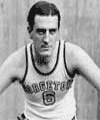Henry Hyde (1942-1947)
In the 100th anniversary year of Georgetown Basketball, Henry Hyde was one of four surviving members of Georgetown's 1942-43 Final Four club. But just getting to Georgetown was a challenge all its own.
As relayed in an article from the Chicago Tribune, George Washington University law professor Jonathan Turley wrote: "When the Hydes lost their house in Evanston during the Depression, they were forced to live above a Chicago tavern on Howard Street. They could not afford the $1-a-month tuition to go to St. Margaret Mary Catholic Elementary School, so he worked at the school to pay it off. In high school, he ignored the taunts of his classmates and worked as "their" janitor to pay the tuition at St. George High School. Hyde won a basketball scholarship and went to Georgetown University."
"Hyde's difficult early life left him with a deep understanding and sympathy for people with little money or power. Fact is, I've never met anyone who knew Hyde and did not like him, even those on the other side of the intense battles of his career."
Hyde played in only 11 games in his rookie season of 1942-43, but none more important than the NCAA semifinal versus heavily favored DePaul. When 6-9 center John Mahnken was sidelined with foul trouble, the 6-3 Hyde faced 6-11 All-American George Mikan with the game on the line.
"Coach [Ray] Meyer didn't pick up on Hyde's entrance as Mahnken fouled out, and sat his 6-11 center down after Mikan connected on the free throws," per this excerpt from the Georgetown Basketball History Project. "Georgetown then went on a 5-0 run and when Mikan returned, Hyde had his number. For the last nine minutes of the game, the DePaul All-American was held in check by the smaller Hyde, astonishing the crowd."
Hyde also knew to play tough, too, a trait that served him well in his eventual political career. "So just as Mikan was about to shoot, I gave him a little push," Hyde told the Washington Post in 1998. "Oh, it's great to be young," he laughed.
Following a tour of duty in World War II, Hyde returned to Georgetown to complete his degree in 1947, earning a law degree at Loyola-Chicago in 1949. After nearly two decades as an Chicago attorney, Hyde was elected to the Illinois state house in 1966, earning a reputation as a tough but conservative lawmaker with respect on both sides of the aisle. In 1974, Hyde was elected to Congress, and immediately became a champion of the pro-life cause, helping craft the Hyde Amendment of 1976, which banned Medicaid funding for elective abortions.
Hyde served 32 years in Congress, having served as chairman of the House Judiciary Committee and International Affairs Committee. He supported his party's leadership, but was not afraid to stand on his own. He supported the Brady Bill against his colleagues, supported extended family leave legislation, and rallied bipartisan support for an $15 billion AIDS relief package in Africa.
"If you took the whole mosaic of legislative things in which he was involved, I would not characterize him as an ideologue," said former House leader Robert Michel. "He was a pragmatist and a doer. He wanted to get things done and make things go."
Hyde was selected by the Republican leadership as the lead manager in the impeachment trial of Bill Clinton (C'68) in 1998. The ordeal wounded his bipartisan reputation but he stood resolute. "Five months later, after a trial and much tribulation, I have no regrets," said Hyde following the trial. "We fulfilled our oath of office to discharge our duty according to the Constitution."
"Hyde was one of the last of the "Old Guard," recalled Turley. "He was widely viewed in Congress as someone who valued consensus and played fairly with colleagues."
One of Hyde's last appearances for Georgetown came at a 2004 Hoya Hoop Club reception honoring the surviving members of the 1943 NCAA finalist team. Despite ongoing back problems, Hyde was able to attend the event, where he joined teammates Dan Gabbianelli, Dan Kraus, Miggs Reilly, and Andy Kostecka at a halftime ceremony at MCI Center. Due to health issues, Hyde was unable to attend the 100th anniversary festivities in 2007, and died later that year.
"Though we were often on opposite sides of various issues, we were able to join together on certain issues, such as family leave laws, to make progress for all Americans," said then-House Speaker Nancy Pelosi. "I hope it is a comfort to Chairman Hyde's three children and four grandchildren that so many people mourn their loss and are praying for them in this sad time."
| Season | GP | GS | Min | FG | FGA | % | 3FG | 3GA | % | FT | FTA | % | Off | Reb | Avg | PF | Ast | Blk | Stl | Pts | Avg |
|---|---|---|---|---|---|---|---|---|---|---|---|---|---|---|---|---|---|---|---|---|---|
| 1942-43 | 11 | 2 | 0.2 | ||||||||||||||||||
| 1946-47 | 1 | 0 | 0.0 | ||||||||||||||||||
| Totals | 12 | 2 | 0.2 |
